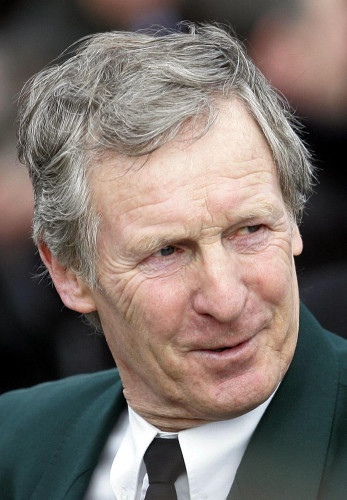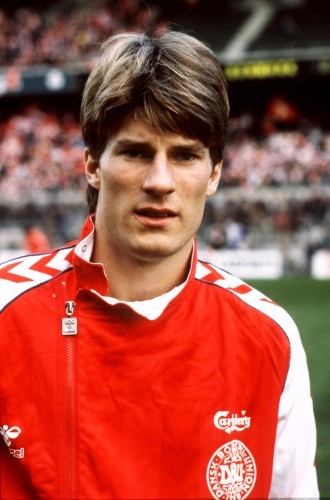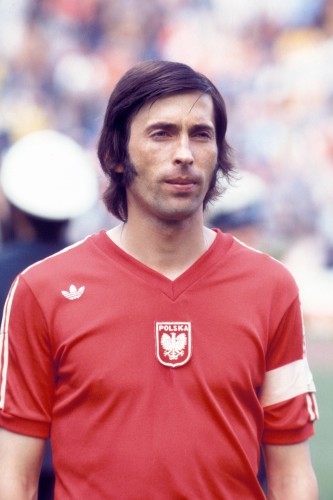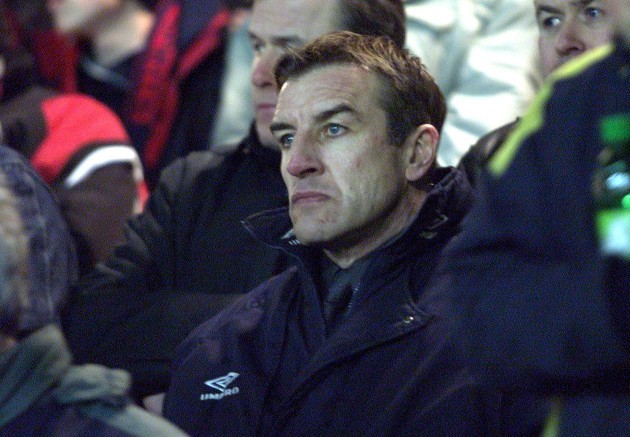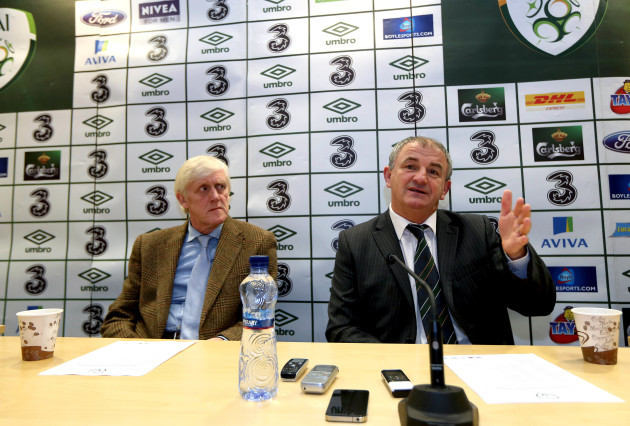THESE DAYS, HARRY McCue, the former League of Ireland star, works tirelessly with youngsters trying to carve out a career in the game.
Many of those McCue coaches are all too familiar with the feeling of rejection, having come back home to Ireland after being let go by clubs in England.
McCue preaches the importance of mental strength, hard work and perseverance — values that served him well in his distinguished career. He knows full well that not every footballer is a quick developer — after all, at his first two clubs, Home Farm and Shamrock Rovers, he left because of a lack of first-team action.
It was only at his third team, Athlone Town, that McCue’s career started to take off, and even then, he was by no means an automatic starter initially, and had to show considerable patience before getting an opportunity to play regularly.
Perhaps then, it is no surprise that McCue feels such an affinity with the young, modern-day footballers, who he tries to help forge a career in such an unforgiving game.
******
McCue started out at Home Farm. His father was a big influence, having enjoyed a notable career himself in the 1950s and ’60s, lining out for Bohemians, Limerick and Waterford, in addition to representing Ireland amateurs.
His sister Siobhan was a highly regard player in women’s football, while two of his cousins, Fran and Ray O’Brien, both represented Ireland at senior level and enjoyed lengthy careers in England and North America respectively.
“[My father] coached at Home Farm as well — not my particular team. He coached with the first team when I was a youth there,” McCue tells The42. “I came into the first team and probably felt a little bit uncomfortable with him being there as a manager.”
McCue had joined Home Farm at the age of 12 and was part of an underage side that went on a remarkable 79-game winning run, earning a place in the Guinness Book of Records as a result.
[The former Man United and Bohs player] Ashley Grimes got the winner against us for Stella Maris in the 80th game. We had a great little team for sure — 12s, 13s, 14s, 15s, 16s. We got beaten then, but we got in the Guinness Book of Records for most wins.
“We used to play against Manchester United every year in their training ground, the Cliff. That was a great bonus for us. We didn’t win those games every year. We had Noel Mitten, our centre forward at the time. [Ex-Man United player] Bill Foulkes was the reserves manager and he signed Noel Mitten after one of our games, so they were keeping an eye on us for sure, but unfortunately, [Noel] was the only one that got signed up.
“A lot of lads got capped and stuff like that, went on trials here, there and everywhere. A lot of them then just settled for playing for the Home Farm senior team in the League of Ireland and that was a great incentive. Lads went on to play for other clubs in the league then.”
McCue admits to being disappointed at never getting the opportunity to play for a club across the water himself, though he came very close on one occasion. It was during his time with Athlone. They were playing in an All-Ireland Cup match with Linfield. McCue was marking Colin McCurdy, a Northern Ireland international. He kept the attacker quiet and was named man of the match afterwards. Legendary Lisbon Lion and then-Celtic boss Billy McNeill was in attendance and liked what he saw.
There was a fee organised. He said he’d come back and have another look at me. It was a toss-up between me and Derek Whyte and they went for him. That’s the way it goes.”
While Whyte went on to make over 200 appearances for Celtic, McCue enjoyed a good career in his own right. On his success, the Dubliner regards playing in the League of Ireland B competition as crucial to his development and feels Irish football sorely lacks a similar outlet today for young players who aren’t quite ready for first-team football after leaving the national U19s league.
McCue, though, was fortunate to get his first break in the game at a young age. Dave Bacuzzi handed the 18-year-old his League of Ireland debut in the 1975-76 campaign — the season after Home Farm had won their one and only FAI Cup — as the team struggled towards the bottom of the table.
Frustrated by a lack of first-team opportunities, however, McCue linked up with Seán Thomas the following season at Shamrock Rovers. The club were one of the weakest sides in the League of Ireland at the time. Having finished bottom of the table in 1976, former Hoops player Thomas was tasked with rebuilding the club and he gave opportunities to a number of youngsters, including McCue.
However, Rovers’ initial improvement was only marginal, finishing 11th in the 14-team league, though they did win the League Cup — their first trophy in seven years. Nevertheless, Thomas lasted just a year in the job. He was replaced by John Giles, who brought senior internationals such as Ray Treacy and Eamon Dunphy back with him from England. Moreover, the Leeds and Ireland legend had ambitious plans to get the club regularly competing not just at the highest level domestically, but in Europe as well. Unfortunately, these grand ideas failed, with the 1978 FAI Cup the only trophy the Hoops claimed during that era.
McCue, meanwhile, found himself out of the first-team picture upon Giles’ arrival, and decided to try his luck elsewhere.
“Although John Giles didn’t want me to leave, I was determined to play first-team football,” he remembers. “I would have loved to have stayed with Giles, because I thought he was fantastic — Eamon Dunphy and Ray Treacy were there too. There was a great atmosphere in the place. Full-time football, local lads like Noel Synnott, Alan O’Neill and Robbie Gaffney got a chance.”
In 1977, McCue reunited with his old boss, Thomas, up in Athlone. With an experienced first-choice central defence that included club captain Pat Whelan, McCue again had to be patient and wait for his chance in the first team.
Yet the young defender eventually established himself in the starting XI and the club simultaneously went from strength to strength. As is the case now, Athlone were not considered among the top clubs in the League of Ireland at the time. However, the arrival of hometown hero Turlough O’Connor as manager changed that perception.
With McCue an important member of the side, Athlone won the league for the first time ever in 1981, in the process breaking records for number of goals scored (67), number of points earned (51 – back when it was two points for a win) and longest unbeaten run (27 matches).
To this day, McCue and team-mates such as Noel Larkin, Tom Conway, Larry Wyse and Mickey O’Connor are remembered fondly, with a celebration to mark the 30th anniversary of the triumph organised in 2011.
“Great bunch of lads, great team spirit, great crowds,” McCue recalls. “The whole town got behind the club, sponsors, it’s like everything else — success breeds success.
With six to eight games left, we had the league well won. We never got beaten in Athlone, we drew one and won the rest. No one could touch us down there — it was a close-knit ground, a great atmosphere, we were really hard to beat.”
Seamus O’Brien, the chairman of the club at the time, was so delighted with the achievement that he brought the squad on a week-long trip to New York to celebrate.
After finishing fourth the next season, Athlone reclaimed the title in the 1982-83 campaign, as the club continued to enjoy the kind of success that had previously eluded them. That said, having joined the League of Ireland ahead of the 1922-23 season, they dropped out in 1928 and only came back in for the 1969-70 campaign, so they didn’t exactly get too many opportunities to win titles in previous years.
The St Mel’s Park outfit’s domestic success led to some memorable European nights also. Having famously held AC Milan in the 1975 Uefa Cup before McCue joined, they played Copenhagen-based side KB in 1981, and acquitted themselves admirably.
Future manager Michael O’Connor gave the visitors a fourth-minute lead in Parken Stadium, before they ultimately earned an encouraging 1-1 draw. The second leg at home was similarly closely fought. Two late Eugene Davis goals brought the match level at 2-2 and gave the hosts hope, but they bowed out on away goals ultimately. And it was during this memorable tie that McCue came up against a player who would go on to become one of the game’s all-time greats, playing for Juventus, Barcelona, Real Madrid and Ajax among others.
“Michael Laudrup was their star player at the time. He came to Athlone then… He was 17 years of age. Turlough had me man-marking him, so that was tough, but a great experience.”
McCue would make over 100 appearances in total for Athlone during a six-year period. In addition to the two league titles, he also won two League Cups (1981-82 and 1982-83) and the All-Ireland Cup (1979-80). Around this time, he also had short spells in Pittsburgh under coach John Kowalski and subsequently with San Diego Sockers.
In that era, with footballers nowhere near as financially well off as they are today, it was fairly commonplace for English and Irish-based players to spend the summer months playing in North America to earn extra cash. Consequently, McCue joined a number of international players Stateside. In fact, his roommate over there was legendary Polish player Kazimierz Deyna, who would die tragically in a car accident in 1989.
“He was such a talent. He literally could take a penalty with his right or left foot. It didn’t matter. He also loved his music. All his friends used to flock to the hotel after the games. He was hugely popular in America, as he was in the Polish team.
“[The manager] Ron Newman was very good to me. He signed me.
“There was a Mexican international, Hugo Perez. The crowds flocked to him every Saturday night. They had huge success — they packed it out every night in the indoor [football]. Unfortunately, they never progressed in outdoor. But they had a great fan base there in southern California.
“It was just a short-term thing [for me]. The league closed. They asked me to come down to play indoor, which didn’t suit.
“I was trying to stay in America at the time, but Glentoran came in and Ronnie McFall asked me to sign.”
Consequently, in 1984, McCue joined the Northern Irish side on a three-year deal.
It was the height of the Troubles. I had a few incidents, but regarding the club itself, they were very supportive of me and always made me very welcome.
“We played Standard Liege [in the 1984-85 Uefa Cup]. [Ex-West Germany international] Horst Hrubesch — ‘the Big Monster’ as they called him — came to Belfast. [Many years later] He was with the German 21s [as a coach] and I was with the Ireland 21s. I remembered him and he certainly remembered Belfast in the ’80s. But I suppose you would do.
“It was a great experience. We had at least six Northern Ireland internationals in the team. Leo ‘Pop’ Flanagan and Damien Byrne played at Crusaders and we used to travel up together every Saturday. We played the game and came home then.
“[The political tensions were] in the back of my mind. People always reminded me of it. It was in the papers every day. It was more or less full-time at the time. We used to stay over in Belfast. But they protected me very well. There was the very odd time where I was told not to travel. It was just too tense. Normally I’d come up, a lot of my family would come up as well, friends would travel. We stayed with them and would socialise. We never really had any problems whatsoever. It was a good experience all round.”
A bad ankle injury cut short McCue’s spell at Glentoran and he had a short stint on loan at Drogheda in the 1984-85 campaign, but could not prevent their relegation to the recently created First Division.
Prior to the following season, McCue got a call from his old Athlone boss O’Connor, who was now managing Dundalk, and the player agreed to join the Louth club. He proceeded to spend three years with the Lilywhites, with the likes of Paul Newe, John Cleary and Michael O’Connor also added to the squad.
In McCue’s final season there, an injury early in the 1987-88 campaign saw him lose his spot in the starting XI, with John Cleary and Joey Malone the preferred centre-back partnership. However, he won his place back in the side in the second half of the campaign, as the Oriel Park outfit secured a league and cup double.
A controversial penalty, converted by Cleary, helped Dundalk earn a 1-0 win over Derry at Dalymount Park in what would prove to be McCue’s last-ever League of Ireland game as a player in front of over 20,000 fans in the 1988 cup final.
“Defensively, we were very strong. I think it was a record for Alan O’Neill [in terms of clean sheets]. It was a very successful team. Dessie Gorman and Terry Eviston [were among the standout players].”
Shortly thereafter, McCue emigrated to Australia. He worked out there as both a player and coach with semi-professional side Manly United Freshwater FC in Sydney in the New South Wales State League.
“A great experience,” he recalls. “Croatian, Serbian, Italians — a huge mixture, some really good players and coaching.
I was back there at Christmas. I went to see a couple of games and was really impressed. Brandon O’Neill was playing for Sydney, both his parents are from Dublin. I went to see him play and recommended him to the FAI, but he’s just been brought into the Aussie team. He’s definitely a kid with potential. The day I was there, about five months ago, there were a couple of English clubs looking at him, so you might hear of him coming over to England in the future.”
After nearly 10 years away, McCue returned to Ireland in October 1997, joining Drogheda as assistant boss to former Dundalk team-mate Martin Lawlor.
“I spent six years there and became manager. It was a bit of a yo-yo club – we were up and down,” he says.
After being appointed as manager in June 2000, McCue managed to guide the Drogs to promotion to the top flight, despite the club being hampered by financial limitations.
In their first season back in the Premier Division, the team survived in dramatic circumstances. They needed to beat Galway in a play-off to retain their top-flight status. After losing the first leg 2-0, they looked dead and buried, but an improbable 3-0 home win in the return fixture ensured their safety.
“I more or less told Drogheda that if they didn’t go full-time, I would probably leave the club. I just couldn’t bare going back down to that First Division. The board of directors backed me. We had a split — 11 full-timers and 11 part-timers. We stayed up in the Premier Division for the first time in a long time.
“It was the start of something in Drogheda. The crowds came back. More money and directors came into the club. Eventually, they took Paul Doolin in [as manager] and the rest is history. They went totally full-time then and won the league and cups. But I’d like to think I started it off.
“The following year, we were third from bottom. We were hoping [to improve]. But they moved me on. That’s football.
“I was hoping they would move grounds — that was always in the plans, but nothing materialised unfortunately.
“To build on success with a new ground at the time would have been the way to go, but it didn’t happen, and unfortunately, they’re back in the First Division now.”
Drogheda proved to be the end of McCue’s time in the League of Ireland. Since 2004, he has been working for the FAI and currently runs their ETB Player Development Course in Cabra, working regularly with 16-19-year-old players that are hoping to make it as professionals.
During more than a decade with the association, McCue — who holds a Uefa Pro License — has also worked with Ireland U18s as an assistant to Sean McCaffrey, and more recently, as Noel King’s number two for the national team’s U21 side.
So over the years, McCue has helped develop a number of Ireland’s top players.
A standout for me was James McCarthy,” he says. “Himself, Robbie [Brady] and Shane Duffy were always destined to be full-time and senior internationals. Matt Doherty was on my course in Cabra. Enda Stevens was as well.
“Unfortunately, Tommie Hoban picked up an injury. He was at Watford and was our captain at one stage. We always had high hopes for him — he just had an awful run of injuries. Jeff Hendrick was with us, Richie Towell. So we had some good sides, up to the latest — Josh Cullen and those lads now have been brought into the senior team.
“After eight years, I was ‘stood down,’ as they put it, about a year ago from the U21s. I don’t want to comment too much on it.
“I’m still with the academies. We started off with one in Cabra, now we’ve 11 around the country. I’ve worked pretty hard establishing them and getting them up and running around the country in the early years. They’ve been a great success.
“The Department of Employment Affairs and Social Protection have offered fantastic support. They’ve helped out so much — €1.4 million a year into the courses and they have been a great success with lads progressing into football. We’ve lads coming in in direct provision in Mosney. One particular lad was a refugee in direct provision, and he’s now signed a three-year contract at Dundalk, Lido Lotefa. So that’s a huge success story for us.
“Another huge success is the progression to third-level education — lads coming back from England with Junior Certs and taking back the Recreation and Exercise Certificate here and getting the required points. You see some lads not even doing their Leaving Cert, going on to three or four-year degrees in IT Blanchardstown or DIT. So it’s a fantastic incentive, especially for repatriated players.”
Of the differences between footballers who make it as pros and those who don’t, McCue adds: “They all have a certain amount of talent, but it’s definitely the single-mindedness of the whole thing, the dedication — you have to have that, otherwise you’ll never make it. You have to be driven, because it’s a tough game to make it in.
“Skilful players like Robbie Brady still have a huge determination — he [left] Man United and still made it. He always had that drive and that ambition to kick on.”
And as for the future of Irish football, McCue admits he’s “worried about a couple of things”.
He explains: “There’s the U19 league and after that, nothing. That has me worried. I’ve lobbied it a couple of times with the powers that be. Going to a 23s league, I’ve discussed it with Ruud Dokter, John Delaney and people like that. I made proposals to the FAI regarding a national football academy, based on Leinster Rugby. I went out there and spent time with Leinster Rugby. It’s 16-19 year-olds, residential, based in Abbotstown, doing their Leaving Cert. The 10 best 16-year-olds come in every year and 10 go out at the end at 19.
It’s the way to go — they go back to their clubs at the weekend, they sign a three-year contract and hopefully at the end of it, they’ll be a 19-year-old with a Leaving Cert ready to go to England or play in the League of Ireland.
“Unfortunately, [the initiative] didn’t materialise. I think the FAI’s view was that the academy should be at clubs. There’s definitely some merit in that for sure. But I just don’t think the clubs are structurally developed to support academies for young lads with education.
“The model I based it on is the most successful rugby academy in Europe. They started in 2004 as well, they’re going a long time, so this is a thing to grow over the years. Maybe Niall Quinn will take it on and work with the FAI on it.
“On my present course, I have five back from England after being four years there. Without naming names, they’re getting into clubs at the moment, but it’s very tough on them. I can see how hard they’re striving, maybe just leaving their home, getting educated, getting back into clubs. I work for the FAI. They liaise on the kids going away and coming back. There has to be a better way of doing things regarding the knowledge of these young lads, where they’re going and what their future holds. Our communication has to be better regarding these young lads coming back from England.”
The42 is on Instagram! Tap the button below on your phone to follow us!

